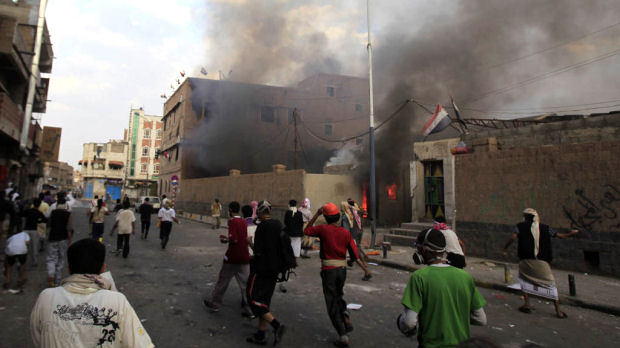Yemen troops ‘targeting protesters’
As at least 21 people are killed in the Yemeni capital Sanaa in the worst violence since March. Channel 4 News learns from a freelance journalist of one baby girl shot in the head by a stray bullet.

The killings happened a day after 26 anti-government protesters were shot dead while demonstrating in Change Square, making it the bloodiest period in Yemen since 52 people were killed in mid-March.
The renewed crackdown began when government troops fired on a crowd of protesters in the square.
It provoked firece gun and artillery battles between government soldiers and General Ali Mohsen’s First Armoured Division troops, who defecteded to the opposition several months ago.
Trucks full of Mohsen troops could be seen rushing from Change Square in the direction of the gunfire.
Today I witnessed a 10-month-old baby shot in the head by a stray bullet. She survived for half an hour, Tom Finn, Journalist
Freelance journalist Tom Finn, who has been in Yemen throughout the unrest, told Channel 4 News that civilians were not only being caught in the crossfire, but they were also being actively targeted by government snipers and artillery fire.
“These are the heaviest clashes we’ve seen yet, eclipsing what happened in March.
“The use of heavy artillery is very worrying. I have seen bodies with arms and legs blown off. Today I witnessed a 10-month-old baby shot in the head by a stray bullet. She survived for half an hour.
“The medical situation is pretty chaotic here. Most of the wounded are suffering from tear gas and bullet wounds. The hospitals are overwhelmed, supplies are running low. It is a very desperate situation.”
Crackdown condemned
Foreign Secretary William Hague called on Yemen’s government to stop the killing, and for all sides to negotiate.
“The responsibility for preserving law and order, respecting the right to peaceful protest and ensuring early justice for the victims of yesterday’s attacks, rests with the government of Yemen,” Mr Hague said.
“We strongly support continuing negotiations for a peaceful settlement to the crisis.”
His comments came amid reports that Abdrabuh Mansur Hadi, Yemen’s vice-president, would sign a Gulf Arab initiative to arrange for a transfer of power in Yemen “within a week”.
Responsibility for ensuring early justice for the victims of yesterday’s attacks rests with the government of Yemen. William Hague, Foreign Secretary
“Within a week, the vice-president will sign the Gulf Initiative in the name of the president,” a high-ranking Saudi official, who requested anonymity, told reporters.
The initiative is being mediated by the six-nation Gulf Co-operation Council and sets a course for a peaceful transition of power to the opposition, but President Saleh has so far back-tracked on a deal three times.
In Geneva Yemeni Foreign Minister Abubakr Abdullah Al-Qirbi said Sunday’s bloodshed would be investigated and perpetrators would be prosecuted.
In a speech to the UN Human Rights Council, he said: “The government of Yemen expresses its sorrow and condemnation for all acts of violence and bloodshed as those that happened yesterday in Sanaa. The government will investigate and hold accountable all those in charge of these acts.”
President Saleh left the country three months ago for Saudi Arabia where he has been recovering from a 3 June attack on his presidential compound.
